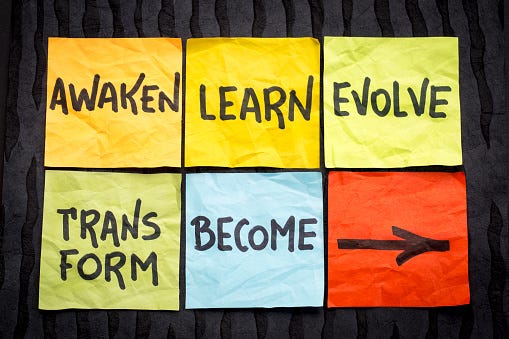“This newsletter serves a demographic of highly intelligent readers, and deep thinkers with a passion for ideas, critical thinking, and a desire to understand the world around them. Readers of my posts are usually tired of being patronized elsewhere by fact-less, opinionated know-nothings, misinformation, conspiracy theories, and fake news.
“Knowledge is power, wisdom brings meaning, contentment, and happiness!”
——————————————————————————————————————
On a personal note: Please excuse grammatical errors, typos, repetition, and any general nonsense, and such in this post. I am getting a bit older now, and I have about 20,000 pages of information that must get published before I leave the mortal coil. I simply write and publish more than my humble editors are able to correct. If you find enough errors you are welcome to contact me about being an editor of my work.
Thanks for sharing this newsletter with your friends and associates - Join us for daily tips on personal development at our free Self-Improvement for Beginners Group and Forum
Click Below or cut and paste the URL to Join
https://www.facebook.com/groups/455029215769173
———————————————————
A 3 Minute Read
Q. Lewis, how do they make all those vegan products look like actual meat, cheese, eggs, etc.?
A. The answer to this question is not as simple as it may seem Back in 1976 I attended the first World Vegetarian Conference.
Those attending this event were mostly people who did not eat any meat, poultry, game, fish, shellfish, or by-products of animal slaughter. Within this mix of individuals were…
• Lacto-vegetarians - Those who used milk products,
• Lacto-ovo vegetarians – Those who ate milk and egg products,
• …and vegans - Those whose diets, for the most part contained various levels of fruits, vegetables, grains, pulses, nuts, and seeds, and no animal products of any kind, including honey.
I remember back then, that the vegans were considered outsiders in a way. Their numbers were much smaller than the other groups who defined themselves as vegetarians, and the vegans were more passionate, eccentric, and dogmatic than the others.
The word 'vegan' was coined by Donald Watson and his then-future wife Dorothy Morgan in 1944. It was derived from 'Allvega' and 'Allvegan' which had been used and suggested beforehand by original members and future officers of the society George A. Henderson and his wife Fay, the latter of whom wrote the first vegan recipe book. At first, they used it to mean "non-dairy vegetarian", however, by May 1945, vegans explicitly abstained from "eggs, honey; and animals' milk, butter, and cheese". From 1951, the Society defined it as "the doctrine that man should live without exploiting animals". Interest in veganism increased significantly in the 2010s, especially in the latter half, with more vegan stores opening and more vegan options becoming increasingly available in supermarkets and restaurants worldwide.
Today, veganism has had an influence on personal lifestyle, and public policy that could never have been imagined back in 1977. In fact, when you go to a supermarket you are likely to find an entire section dedicated to vegan, meat, and egg replacement products.
Below is an article about how these foods, especially egg substitutes are created.
https://www.bbc.com/future/article/20220120-the-race-to-make-a-multipurpose-vegan-egg
What makes veganism unique among the many categories of vegetarianism is that more than any other Veganism rejects the commodity status of animals.
Of course, distinctions may be made between several categories of veganism.
Dietary vegans - Also known as "strict vegetarians", refrain from consuming meat, eggs, dairy products, and any other animal-derived substances.
An ethical vegan is someone who not only follows a plant-based diet but extends the philosophy into other areas of their lives, opposes the use of animals for any purpose, and tries to avoid any cruelty and exploitation of all animals including humans.
Another term is "environmental veganism", which refers to the avoidance of animal products on the premise that the industrial farming of animals is environmentally damaging and unsustainable.
The Takeaway
Well-planned vegan diets are regarded as appropriate for all stages of life, including infancy and pregnancy. Some nutritionists do not recommend vegan diets for children or adolescents, or during pregnancy and breastfeeding, but a vegan who has done their research and made intelligent choices can adjust so that veganism can work well even in this situation.
There is some evidence for vegan diets providing a protective effect against various health problems, and some evidence suggests that a vegan diet can help with weight loss, especially in the short term. Vegan diets tend to be higher in dietary fiber, magnesium, folic acid, vitamin C, vitamin E, iron, and phytochemicals, and lower in dietary energy, saturated fat, cholesterol, omega-3 fatty acid, vitamin D, calcium, zinc, and vitamin B12.
Please keep in mind that a poorly-planned vegan diet may lead to nutritional deficiencies that nullify any beneficial effects and may cause serious health issues, some of which can only be prevented with fortified foods or dietary supplements.
Vitamin B12 supplementation is important because its deficiency can cause blood disorders and potentially irreversible neurological damage; this danger is also one of the most common in poorly-planned non-vegan diets.
———————————————————
Author: Lewis Harrison is a practical philosopher, an Independent Scholar, and a Health Coach. He has a passion for knowledge, personal development, applied game theory, self-improvement, creativity, innovation, problem-solving, functional medicine, natural healing, and story-telling. He is a practitioner of Transmoderm Zen. Lewis Harrison is also a speaker, best-selling author, and the creator of the Best Course to Happiness…at Last.
—————————————————
—————————————————
If you want to live a struggle-free life, filled with knowledge and wisdom, you can do so by becoming a master life hacker. Learn more aboutvegamisn, and other simple lifestyle hacks by exploring my course Winning the Game of Life: Lewis Harrison’s Life Strategies Playbook Method from A-Z.
Click on the button just below or copy and paste the link to learn more about the course …
————————————









